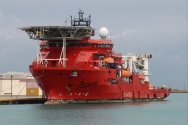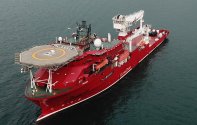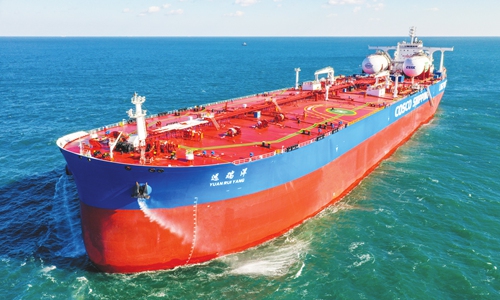Demand comes from profitable ocean freight sector
By GT staff reporters Published: Mar 09, 2022 08:39 PM
The handover ceremony of COSCO SHIPPING Energy's Yuan Rui Yang was held in Dalian, Northeast China's Liaoning Province, marking the successful delivery of the world's first liquefied natural gas dual-fuel (fuel and gas) powered ship tailored for COSCO Shipping by Dalian Shipbuilding Industry Co. Photo: cnsphoto
Orders for new cargo ships have rushed to Chinese shipbuilders in the past week, as the sky-high profits of shipping companies boosted by skyrocketing shipping costs amid the COVID-19 pandemic have given major momentum to new orders, the Global Times learned.
According to some calculations, global shipowners have made new orders worth at least about $2.5 billion in the past week. New construction contracts were dominated by containerships and natural gas carriers, and many are alternative-fuel capable, an industry insider surnamed Xu told the Global Times on Wednesday.
Singapore's Pacific International Lines (PIL) placed an order for four dual-fuel containerships with 14,000-standard container capacity at China's Jiangnan Shipyard, PIL announced on Tuesday.
Abu Dhabi National Oil Co (ADNOC) on Thursday signed contracts for two 175,000-cubic-meter LNG vessels with Jiangnan Shipyard, for around $200 million each.
Jiangnan Shipyard was in talks about orders with several shipowners from both China and overseas for large liquefied natural gas (LNG) carriers above 170,000 cubic meters, according to media reports.
Japanese shipowner StarOcean Marine signed deals for two containerships with 2,500-standard container capacity with China's Zhoushan Changhong International Shipyard on March 1.
At present, global shipping companies are rushing to buy new ships, especially Mediterranean Shipping Co (MSC), which is being aggressive in its expansion and has been buying ships at high prices, Zhong Zhechao, founder of One Shipping, an international logistics service consulting company, told the Global Times on Wednesday.
"However, we believe that this is not directly related to the current tensions between Russia and Ukraine, but because the whole shipping industry is highly profitable," said Zhong.
For instance, Singapore-based PIL completed a $600 million restructuring in March 2021. Thanks to an unprecedented boom in the container shipping market, the company repaid $1 billion well ahead of schedule.
Shipping companies buy new ships in order to increase competitiveness, analysts said.
The expansion showed the ambition of shipping companies and indicated that they are optimistic about the shipping market, especially having witnessed the skyrocketing ocean freight costs since the outbreak of COVID-19, said Xu.
MSC, for example, said that it offers a comprehensive network of shipping services to a wide variety of locations in Europe, "so we expect a limited impact on our overall China-Europe shipping volumes," read a statement sent from MSC to the Global Times.
Meanwhile, Western sanctions against Russian cargo ships could also affect the global shipping market, analysts said.
Russian shipowners together have about 3,000 vessels totaling 18.1 million compensated gross tons (CGTs), or 1.2 percent of the global fleet capacity, according to Clarkson.
China was the largest shipbuilder in the world in 2021, with 22.8 million CGTs, accounting for 50 percent of the global total, while South Korea took 38 percent with 17.35 million CGTs, Clarkson statistics showed.
However, analysts also warned of overcapacity in the shipbuilding industry, citing rising global uncertainties and long order completion time.
"If orders are placed now and production begins immediately, deliveries are expected in the second half of 2024 or the first half of 2025," Xu said.
Many Chinese shipbuilders are already at full capacity. For example, China State Shipping Corp, the nation's largest shipbuilder, said in December that its order backlog extended beyond 2023 and 2024.
Still, it is expected that global new ship order demand will not shrink significantly in 2022, and the transaction volume will be around 90 million deadweight tons (DWT), with more than 40 million DWT from China, said the China Association of the National Shipbuilding Industry in January.



